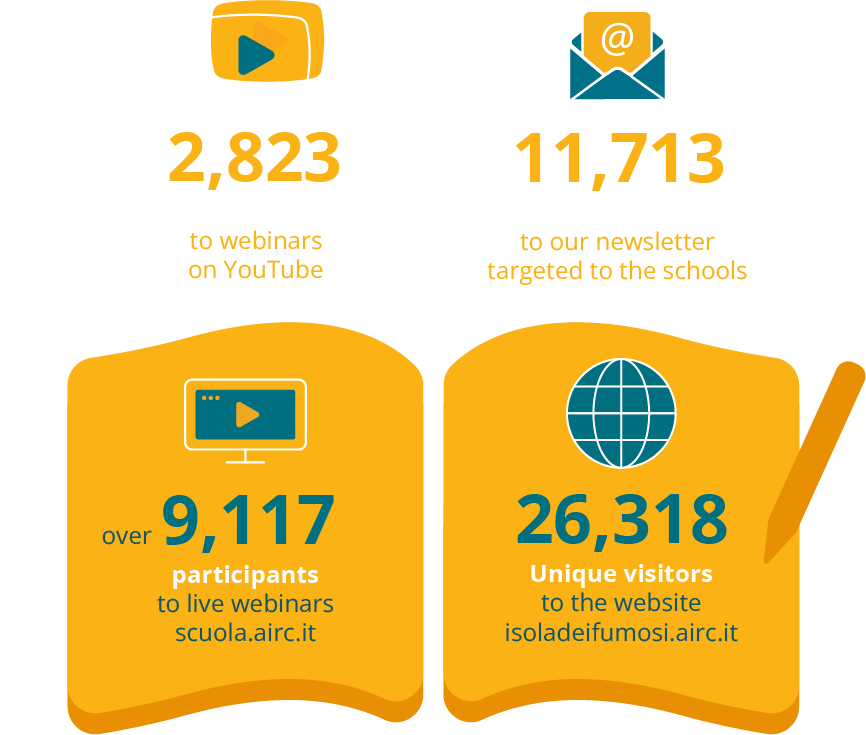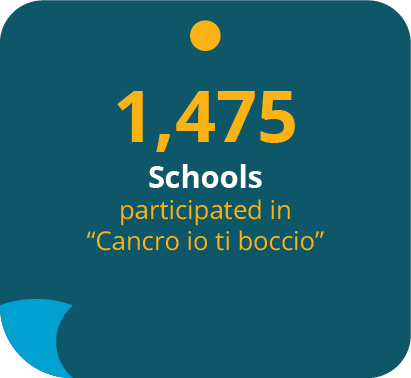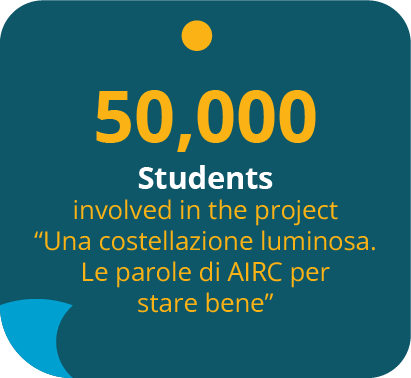Culture of prevention
and communication
Dissemination and Communication
Knowledge is a fundamental weapon to beat cancer, and AIRC knows it well. Over the years, we have been increasingly communicating the results achieved by research, as soon as laboratories made new data available.
AIRC’s communication activities include the dissemination of scientific results and awareness-raising projects focused on prevention, as well as the promotion of fundraising campaigns and activities in schools, universities and science communication festivals.
Central to this strategy is Fondamentale magazine, our voice in the homes of our supporters and one of the most authoritative Italian publications in the field of oncology.
Online presence
For many years, AIRC has been committed to strengthening the relationship with donors and engaging with a younger demographic through digital channels.
New technologies allow us to target a wider audience and increase the effectiveness of our communication efforts.
* unique visitors represent the number of visitors counted once for the period 1 January to 31 December 2024.
** as of 31 December 2024.
Media Communication
In addition to supporting the progress of oncological research by financing projects of excellence, AIRC is committed every day in disseminating scientific information through its channels and with the essential support of the media.
The media are a strategic ally in this dual mission, because they help keeping the audience up-to-date with the results of research and emphasize the importance of the contribution everyone can make to face cancer.
The future of research starts in the classroom
We need the help of everybody to face cancer, and schools are undoubtedly a privileged place to build this awareness.
For this reason, AIRC has long established an intense collaboration with schools, from preschool up to secondary schools, extending to the university through the AIRCampus project, with the aim of bringing young people closer to science and the world of cancer research, working together on topics such as solidarity and active citizenship.
In order to expand our audience, over the last few years we have increased our presence at major scientific dissemination festivals.
I numeri di AIRC nelle scuole

AIRCAMPUS: THE PROJECT WITH ITALIAN UNIVERSITIES GOES ON
Knowledge, innovation, passion, a worthy cause, the future: these are some of the values that guide the work of AIRC researchers, who are relentlessly committed in laboratories across the country.
The same principles inspired AIRCampus, a project launched in 2016 through which AIRC engages with Italian university students: together, for the future of research.
The goal of AIRCampus is to introduce the students to the work of AIRC, its mission and its values, to spread awareness of the “cancer problem” while encouraging young people to get involved in volunteering.
In the 2023/2024 academic year, AIRCampus was hosted by the universities of Padua, Pavia, Ferrara, Federico II of Naples, Cagliari, Trieste, Insubria, and Calabria (Unical).
In agreement with university professors, AIRC involved professionals — including researchers, journalists, communication experts, and nonprofit specialists — who met students both in person and remotely, addressing topics connected to their academic programs and offering them opportunities to explore subjects of personal interest.
Alongside the traditional format, AIRCampus project also includes special projects. An example is the collaboration with Luiss Guido Carli University in Rome, where marketing courses hosted two educational workshops.
During the 2023/2024 academic year, a questionnaire was conducted to explore students’ relationship with the world of communication, aiming to better understand which media they use to get information and which topics they are most interested in. There were 2,014 responses. The most used social media platform was Instagram, and the most popular topic was prevention.

